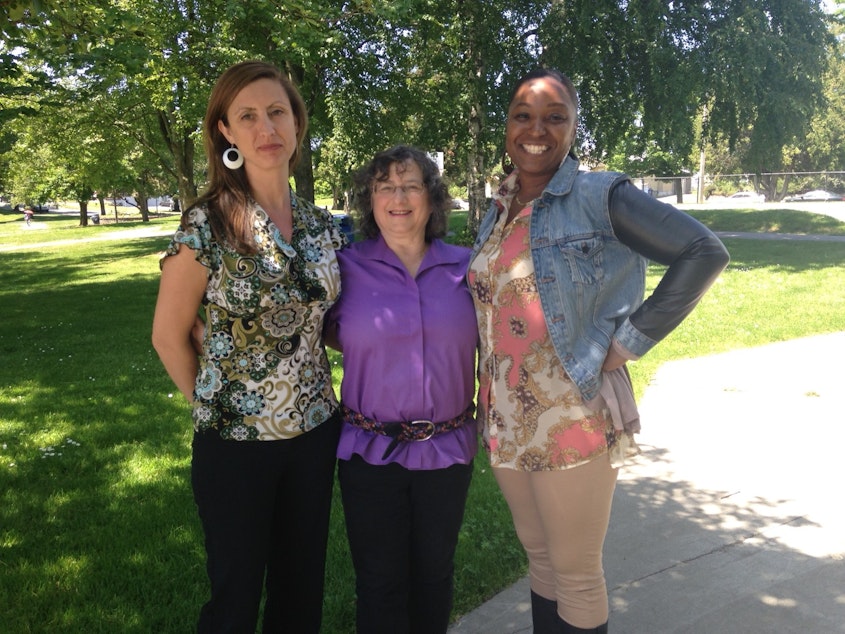Eight Guns, One Week: South Seattle Fights Street Violence

Twenty-three years ago, acting Captain Steve Strand was patrolling Columbia City on a mountain bike, busting alleyway crack dealers. The officers under his charge are still patrolling on mountain bikes, but the neighborhood landscape has changed.
“Our officers on mountain bikes rode up on five kids smoking marijuana in an alleyway," Strand said. "One of the kids, a 14-year-old, ran away and threw a gun in the bushes. Another had a felony warrant, and was carrying a magazine of hollow point bullets that went with the gun.”
Both teens were arrested.
Gun violence has also marked this part of Seattle, prompting Mayor Ed Murray to convene the City Council on Thursday to declare a "summer of safety." The mayor pledged to work with police and community groups to address poverty, teen unemployment, inequality and guns in Seattle’s South Precinct. The South Precinct has the highest rate of violent crime in the city.
There have been more than two dozen shootings in recent months. In the week before I spoke with Strand, he said his officers recovered eight guns.
“We cannot arrest ourselves out of these problems," Strand said. "Arrest is not a solution. Intervention and prevention is where we want to focus. But enforcement is right there behind those.”
That’s a cultural shift that the department is making. It’s one the mayor asked for as well in his address to the council on Thursday. To that end, Strand said he has directed his officers to be more visible.
“It’s not parking behind the building, but parking in front of the building. Where people can see them. It’s getting out of the cars and engaging people in conversation," Strand said.
He said the most effective officers are able to build trust among neighbors who may not be quick to align themselves with law enforcement. There are a lot of reasons why someone in the neighborhood may not call police when they hear or see something. Sometimes it's a language barrier. That's a problem the department can solve, Strand said.
"Just make the call, and we can get interpreters on the line,” he said “It may take a few minutes, but we'll get them." But other reasons are more complicated. Historic mistrust of the police can run deep, and in some neighborhoods an anti-snitch culture prevails.
Still, some neighbors, like Patrice Thomas, want to get involved.
Thomas grew up in southeast Seattle. Standing in Othello Park near Martin Luther King Jr. Way South and South Othello Street, Thomas explained to me that this was her playground when she grew up in the '90s.
“Back then, we actually had summer camps -- like, cold-hearted summer camps," she said smiling. "They would have our lunches over there. We’d play on the basketball court, on the jungle gyms."
But Thomas said that by the mid-2000s, the park was being used for pit bull fights and there were shootings. Many people didn’t feel safe here anymore.
Since 2006, the Othello Park Alliance has worked to reclaim this space. And they’ve had some success. What started out as small summer concerts has grown into an international music and arts festival. On this sunny day, children are playing on the slide, while teenagers play basketball nearby. Despite these efforts, crime here persists.
In May, a gunfight in the park between two groups of teens sent children and parents scrambling. No one was killed, but one woman was injured by shrapnel.
But it’s the kind of news that travels and that shadows people’s perception of safety. For Thomas, changing that dynamic is crucial in making the neighborhoods safer.
“It’s about saying, ‘OK, well, you heard you can’t go to this park. Well, did you know we actually have a concert coming up this Thursday?’" she said. “‘We actually have really great turn out you should check it out.’ It’s about having prepared positive points of reflection to share with people."
Positive talking points only go so far. And not everyone agrees about how to fix things or even what the problems are. The 98118 is one of the most diverse zip codes in the nation. It also has a 20 percent poverty rate, according to the Census Bureau.
Some say development would help. Like a massive new urban village on 13 acres at Rainier and McClellan. Supporters say it will increase the areas walkability and business development. Critics say it won’t do anything about crime.
On Thursday before the council meeting, Mayor Murray ended his speech by recalling Dwone Anderson-Young. Anderson-Young was shot and killed along with another man earlier this month about a mile and a half from the site of the new development.
“This is someone Seattle nurtured,” Murray said. “This bright young African American man was someone that we raised. And we lost him through senseless violence. These young people are our children and we must do better."
Thomas, who works for a nonprofit development organization, said often the greatest is challenge figuring out just how to involve people – how to combat the notion that the people advocating for change are only representing the elite. It’s something she’s heard. But just hearing that criticism in person would mean progress.
“If we’re in a space where you can express that to me that I am not your voice, then we’re in a good place, " Thomas said. “Then take this seat beside me and let’s make sure that your voice is being heard.”

